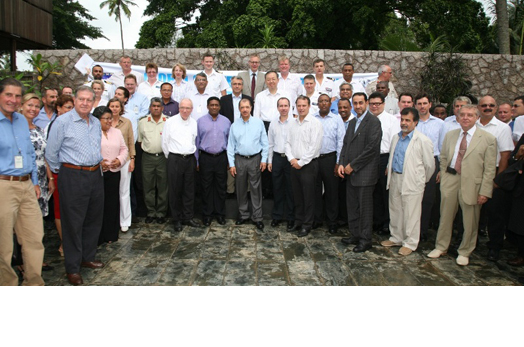
September 7, 2011 -- President James Michel today called on regional powers and international partners to intensify their efforts to 'claim back our oceans' from the hands of pirates, which he said have 'shown a great ability to adapt and exploit any weaknesses.'
He was speaking at the opening of an international anti-piracy conference at Le Méridien Barbarons this morning, titled "Piracy: Orchestrating Response" which is co-hosted by the Seychelles Government and the South Asia and Africa Regional Port Stability Cooperative (SAARPSCO).
"We must strengthen our ability to ensure that we can harness the power of our oceans, of the blue economy, for true sustainable development. For the coastal states of our region- it is essential for our survival. Not only to tackle piracy- but to better prepare ourselves to fight related crimes of drug trafficking, people trafficking, marine pollution and illegal fishing," said President Michel.
He also called on international partners to reinforce shared surveillance, patrols and exchange of information of the Indian Ocean and at the same time to build capacity in the medium term for coastal states to better to be able to be more active partners in surveillance of their waters.  Â
President Michel warned that the piracy problem was becoming a heavy burden on the countries of the region which do not have the adequate resource and capacity for prosecuting and imprisoning pirates.
"In Seychelles, we are grateful to the support of UNODC and the donor countries to be able to construct a new wing of our prison, while also supporting the prosecution services. With thousands of pirates in operation however, it is clear that there is not enough prison capacity in this region to deal with this problem," he told delegates at the meeting opening.
The President said that the international community needed to do more to tackle the financing of piracy and the related transnational crime networks, and in this way disable the illegal maritime activity.
"Most of the funding for piracy originates outside of Somalia; in the same way that most of the profits from piracy are taken out of Somalia. We must build on the already strong law enforcement networks that have been built to fight money laundering and trace the funds that finance terrorism. We must also be prepared to be innovative- and allow regional mechanisms that go beyond national jurisdictions to seize proceeds of crime," said the President.
The opening of the conference was attended by the Vice-President Danny Faure, as well as the President and CEO of SAARPSCO, Hans J. Niebergall, government ministers, high ranking officers of the Seychelles People's Defense Forces, the Seychelles Ports Authority and the Financial Intelligence Unit, as well as corporate and government leaders from the Indian Ocean region and Africa, as well as countries of the European Union, New Zealand, South Korea, , India, the United, and representatives of the United Nations, EUNAVFOR, INTERPOL, EUROPOL, and the U.S. Navy Criminal Investigative Service (NCIS). Â
Editor's Note
-Â Â Â Following the opening of the conference, the President was presented with a book written by a former Seychellois piracy hostage, Captain Francis Roucou, entitled "88 days," which tells the story of his time in Somalia together with the crew members of the Seychelles Explorer in 2009.
-Â Â Â The conference ends on 9th September and is co-chaired by the Minister for Foreign Affairs, Mr Jean-Paul Adam, and the Minister for Home Affairs, Environment, Transport and Energy, Mr Joel Morgan.
-Â Â Â Workshops and panel discussions include:
The global challenge of piracy:Â Piracy, maritime security and information sharing.
The impact of piracy on the fishing, cargo shipping, and cruise line industries.
The operational response to piracy, including Best Management Practices and rules of engagement.
The criminal justice system's position on piracy, including the legal basis for prosecution and the importance of domestic   legislation, as well as elements of Somalia's legal system, involving prisoner detention capacity and complications in the transfer of prisoners.
The private sector's response to piracy, such as the role of private armed guards or the military onboard vessels plus the shipping industry's view on ransoms and their place in the piracy business model.
Deciphering and dismantling piracy's highly developed organizational structure and financial schemes.
The enhancement of port security and the costs of piracy, with special emphasis on both the human and economic tolls.
-   SAARPSCO: The South Asia and Africa Regional Port Stability Cooperative was created in 2008, by the United States Coast Guard, in partnership with South Asian and African nations, to combat piracy in the Indian Ocean and nearby regions. SAARPSCO, with its headquarters in Victoria, Mahe, Seychelles, is also committed to enforcing lawful fishing practices, creating sophisticated vessel tracking systems, promoting international maritime communication, and preserving environmental quality.